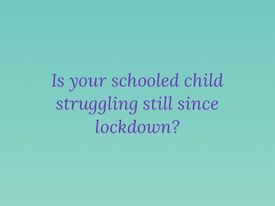
Educational Freedom – article. Flipping the Narrative on Post-Lockdown “Problem Behaviour”.
Written by Stacey
Nearly 4 years post the initial lockdown era, and there are still news articles arising every few months about how lockdown is to blame for violence in schools, for the rise in general “bad behaviour” in teens, and a rise in mental health referrals and anxiety causing increased school absence. The response by those in power (government, schools) is to paint this in a negative light and push the message that we need to get things back to how they were. That school absence is something to be punished with fines. That the anxiety some of our children exhibit is the fault of the family and taking a tougher stance, putting firm boundaries in place, rewarding attendance whilst punishing absence will get things “back on track”.
In the Home Education community, we see large numbers of schooling families on their knees. Their children are in crisis, struggling to attend ever since lockdown and the message being given to those families is that they just need to persevere. For some families there is support but, for an increasing number, there is parental blame, particularly it seems for Neurodivergent children and their families, whether diagnosed or simply suspected. At Educational Freedom, we see new members each and every week reporting how their child(ren) has struggled to attend school since the lockdown era. How they’ve been told to get their child into school by any means necessary, including taking them in their pyjamas (so they get embarrassed into changing into school uniform once in the building), making home life boring and uncomfortable so that school feels like the “better” option, by removing privileges and rewarding attendance, and frequently by allowing their child to be physically manhandled into the building. Read that again – there are children being physically separated from their parent and restrained “for their own good, so they can learn.” In my mind, all that child is learning is that people in authority can physically mistreat them and they’re meant to accept that.
These are parents who are constantly being told that their child’s separation anxiety has been caused by lockdown, or being mollycoddled at home, and is something to be overcome. That their child needs to be pushed to “get back to normal”. But what if we need to flip that narrative? What if lockdown wasn’t something that “prevented their appropriate development”? What if lockdown was the first time these kids were free to live a life that better suited their neurology? The first time they dropped their autistic mask and were able to truly be themselves? What if your child is now being traumatised by being exposed to what used to be normal?
I am a late diagnosed autistic adult, now home educating my autistic child and we are both happy with our life as it currently stands. For us, our day-to-day life isn’t much different from the life everyone was forced to adopt during the lockdown era. We don’t attend big group gatherings, we prefer to stay at home, only meeting up with family or an occasional trip out with people we are comfortable with. We have our bubble, and we protect it to prevent the stress, pressure, sensory overload and general overwhelm of Neurotypical life from bursting it. It suits us. It nurtures us. It brings us joy. And my child is able to learn in a way they were unable to whilst in the school system.
When your child is Neurodivergent (and even when they’re not), it’s a massive assumption on the part of strangers (government, school staff, medical professionals) to say lockdown or parenting style is to blame. For many of us, lockdown was the first experience of a lifestyle (and educational experience) that actually suited us and helped our mental health. So, is it any wonder that we then struggle when we’re forced back into an unsuitable environment? It’s not because we’re broken/too anxious/deficient or wrong; we’re simply wired up differently. There is nothing wrong with that; the only wrongness is being pushed to behave like everyone else just because “it’s how things have always been”.
So, if your child – whether autistic, otherwise Neurodivergent or Neurotypical – is struggling to attend school, consider that it’s not lockdown or parenting to blame, that your child is not doing anything wrong by avoiding the school system. Consider that your child has experienced a way of life that better suits them. Consider this quote by Alexander Den Heijer: When a flower doesn’t bloom, you fix the environment in which it grows, not the flower.
Make sure to find us on social media.
Staffordshire website design and website SEO by Fellowship Studios.